The best fastest VPNs offer fast-performing servers, quality security tools, a strong privacy policy, discounts and a high number of servers. Modern VPN services are very safe to download/install and use. Almost all elite VPNs have multiple independent audit reports to verify claims, money-back guarantees, and online reviews and forum discussions for increased transparency and credibility. VPNs function as an extra layer of protection encrypting user data and changing IP addresses for more privacy. With the rise in surveillance and data collection programs, VPNs have become essential tools for safeguarding privacy and anonymity—making fast services all the more important. This guide will cover some of the fastest VPNs in the world, the features that make a VPN fast, factors that affect VPN speed, why some VPNs are slow and whether factors such as location affect VPN speed. Finally, readers will learn some tips for boosting VPN speeds.

The fastest VPNs for 2023 are given below.
- Private Internet Access VPN
- Mullvad VPN
- NordVPN
- CyberGhost VPN
- IVPN
- TorGuard VPN
- Mozilla VPN
- Hotspot Shield VPN
- HMA VPN
- Bitdefender Premium VPN
Table of Contents
1. Private Internet Access VPN
The primary usage of Private Internet Access (PIA) is when users want a fast VPN service that is able to block content worldwide and has competent customer support. Private Internet Access offers advantages such as user-friendly apps, great security features, extra tools for enhanced privacy and security, a zero-logs policy and a large server network. However, the disadvantages associated with PIA include some slow servers, an inability to consistently unblock Netflix and a U.S.-based headquarters (meaning the VPN is subject to strict surveillance and data laws).
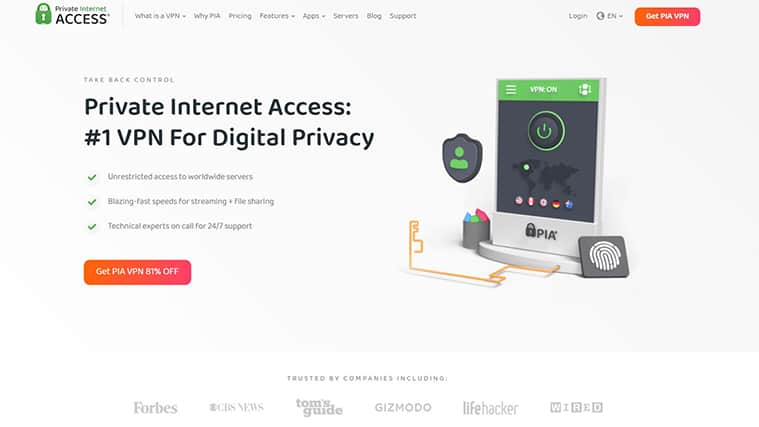
Features that users can only find in Private Internet Access include apps that are fully open-source, multiple encryptions options, cryptocurrency payment support and a fully functional Linux application. Additionally, features that make PIA a strong contender for the best fastest VPNs include torrent support, 10 simultaneous connections and lots of network settings.
PIA is an excellent fast VPN that doesn’t skimp on security, offering features such as AES encryption, support for OpenVPN, a kill switch, port forwarding and split tunneling.
Currently, users can subscribe to PIA by paying $11.99 per month for the one-month deal, $7.50 per month for the six-month deal and $2.19 per month for the two-year deal. Kape Technologies, a company that has been criticized in the past for privacy issues, currently owns PIA. Still, the ownership has little effect on the way PIA works. The service still establishes an encrypted tunnel between a company-owned VPN server and the user’s device. An encrypted connection means no one can see what the user is doing online.

To use Private Internet Access for added privacy and data protection, users have to get a PIA subscription, download/install the app from PIA’s website, and then connect to a suitable server after launching the VPN app and providing login details.
Private Internet Access is considered one of the best fastest VPNs in the world because the service performs well on various speed tests, offers above-average security features (AES encryption, a kill switch and WireGuard support), good privacy (zero logs and open-source apps), huge discounts (over 80%) and lots of servers (over 35,000).
PIA offers plenty of other features readers can learn about in the full Private Internet Access review.
2. Mullvad VPN
Mullvad VPN is among the fastest VPNs in the world, offering quality privacy tools and a trustworthy service.
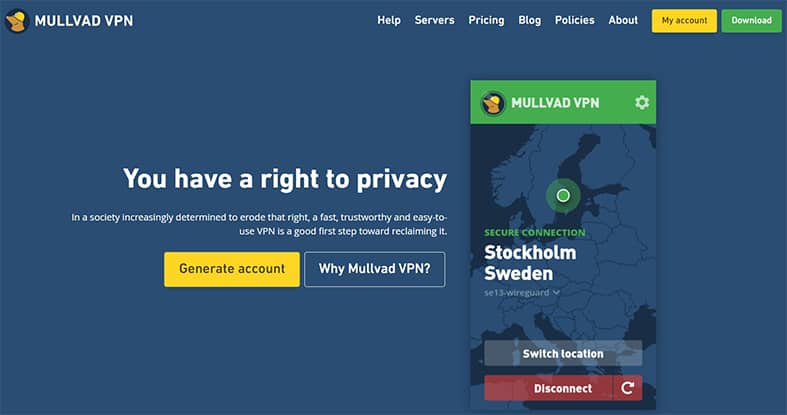
The main advantages of Mullvad VPN are an advanced kill switch, completely anonymous user accounts and fast speeds. The disadvantages of Mullvad VPN, on the other hand, include a lack of discounts and extra features, a small server network compared to competitors, and irregular performance when unblocking Disney+, Amazon Prime Video, Netflix and other streaming services.
The features that truly set Mullvad VPN apart from other elite VPNs are anonymous accounts (no email address required), a headquarters based in Sweden (a country with privacy-friendly laws), dedicated in-house customer support staff and server blocking for a better VPN experience. Mullvad VPN’s strong points include torrent support, IPv6 support, five simultaneous connections per account and leak protection. The security tools of Mullvad VPN include AES cipher, SOCKS5 proxy, multi-hop connections, a kill switch, custom DNS servers, split tunneling, port forwarding and an ad-blocker.
Mullvad VPN’s website states that the subscription package costs 5 euros (equivalent to around $5.37 USD) per month regardless of duration. Mullvad VPN is owned by the company Mullvad VPN AB.
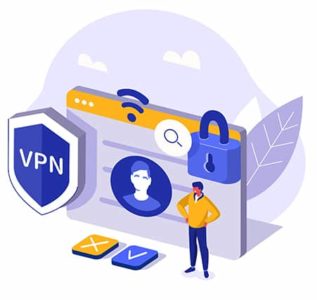
Just like any other traditional VPN service, Mullvad works by routing the user’s internet traffic through an encrypted tunnel between the user’s device and a secure remote server. Since the server becomes the source of the user’s internet traffic, third-party services cannot see the user’s activities. Security Gladiators’ dedicated Mullvad VPN review covers the technical aspects of this VPN in greater detail.
To use Mullvad VPN for speed, users need to first get a package from the VPN’s website; to register, users will need to generate a token from the website. Then, users should download the application file from the website, install and launch the app, input the login credentials and connect to a server.
Mullvad VPN is considered one of the best fast VPNs in the world because of the service’s unmatched transparency (thus increasing privacy and security), good security toolset (multi-hop along with AES encryption and a kill switch), an acceptable number of servers (over 800) and decent pricing (no discounts, though).
3. NordVPN
NordVPN is the VPN of choice for users who want complete threat protection when carrying out tasks in the online world. The main advantages of NordVPN include multiple protocol support, fast server speeds and an intuitive design. But the disadvantages are that the VPN doesn’t have a graphical user interface for the Linux app, lacks a dedicated router app and doesn’t support streaming on all servers.
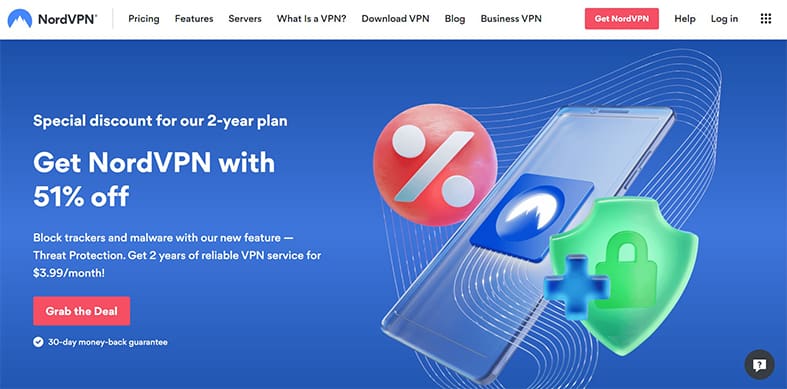
Features that make NordVPN unique include Onion over VPN support, a 30-day money-back guarantee, and extra privacy tools such as NordLynx, NordLayer, NordPass, SmartPlay and NordLocker. NordVPN’s strong points include a straightforward money-back guarantee, fast customer support, the ability to unblock all streaming websites and dedicated apps for all major operating systems.
NordVPN’s security feature set includes dedicated IP servers, peer-to-peer (P2P) servers, obfuscated servers, double encryption, AES encryption, a kill switch, malware protection, auto-connect, an ad-blocker, an anti-tracker and split tunneling.
The price of NordVPN is $11.99 per month for the one-month plan, $4.99 per month for the one-year plan and $3.99 per month for the two-year plan. NordVPN was developed by Nord Security but is owned by Tefincom SA.
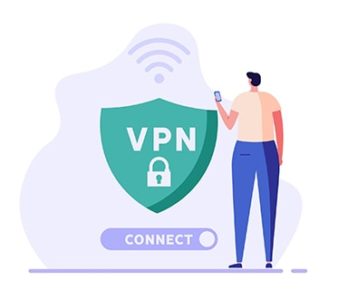
As Security Gladiators explained in the full NordVPN review, this VPN works by connecting the user to a server, applying an encryption protocol to user data that gets transferred in both directions, creating an encrypted tunnel, encrypting the data packets with an outer packet and decrypting once the data arrives at the VPN server or the user’s device.
To use NordVPN, users can subscribe to a package and download the app on the VPN’s website, then install and launch the app and connect to a VPN server.
NordVPN is considered one of the best fastest VPNs because of good security (AES encryption and a ton of extra security features), an above-average privacy policy (zero logs and independent audit reports for verification), big discounts (over 60%) and lots of servers (over 5,500).
4. CyberGhost VPN
CyberGhost is one of the top VPNs in the market today, backed by over a decade of experience. The VPN is mainly used when enhanced privacy is required, but users can also enjoy the VPN’s ability to unblock content that’s restricted in some countries.
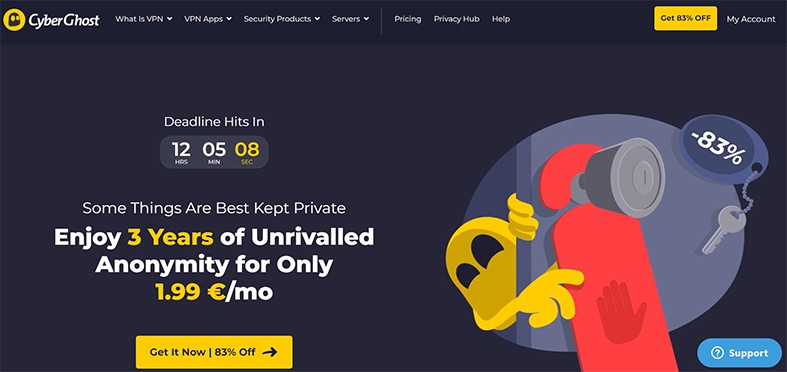
CyberGhost’s most notable advantages include a varied server network, the ability to unblock streaming platforms like Netflix and Amazon Prime, task-specific VPN servers and useful add-ons. CyberGhost, like any other VPN, has disadvantages as well, including a non-transparent privacy policy, an outdated independent audit report (from 2012) and a slightly buggy Windows application.
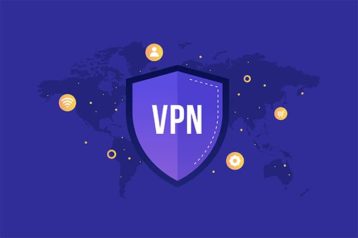
The unique features of CyberGhost VPN include wide cryptocurrency support, a 45-day money-back guarantee on some plans, a free trial lasting 24 hours without any credit card information and a free browser extension with no registration required.
The features that make CyberGhost a strong contender include good customer support, unlimited bandwidth, no restrictions on data consumption even on the free browser extension and seven simultaneous connections per account. Refer to the full CyberGhost review for more insights on this VPN’s features.
Apart from that, the standard security features CyberGhost offers include AES cipher and WireGuard support, a kill switch, “NoSpy” servers, a dedicated IP, an ad-blocker and split tunneling.
To get a CyberGhost subscription, users will have to pay $12.99 per month on the one-month package, $4.29 per month on the one-year package, $3.25 per month on the two-year package and $2.29 per month on the three-year package. The owner of CyberGhost is Kape Technologies, which also owns Private Internet Access (covered above).
CyberGhost protects users’ privacy and internet data by creating an encoded tunnel. The tunnel exists only between the user’s device and a company-owned server. This allows CyberGhost to hide the user’s online activity and change IP addresses. The secure tunnel also makes use of encryption to keep data safe from potential cyber threats.
To use CyberGhost on any device, sign up for a subscription package and download/install a supported app version from the company’s website. Then, connect to a server to start enjoying a private internet connection.
CyberGhost is considered one of the better fast VPNs because of the security tools (AES encryption, auto-connect and a kill switch), a large server network (over 8,000) and deep discounts (over 80%).
5. IVPN
IVPN is a top VPN service offering protection when users require maximum privacy and transparency. IVPN offers advantages such as good WireGuard implementation, a zero-logs policy, flexible plans and advanced security features. The disadvantages of IVPN, however, include a small server network, poor performance when unblocking Amazon Prime or U.S. Netflix and an overwhelming user interface for new VPN users.
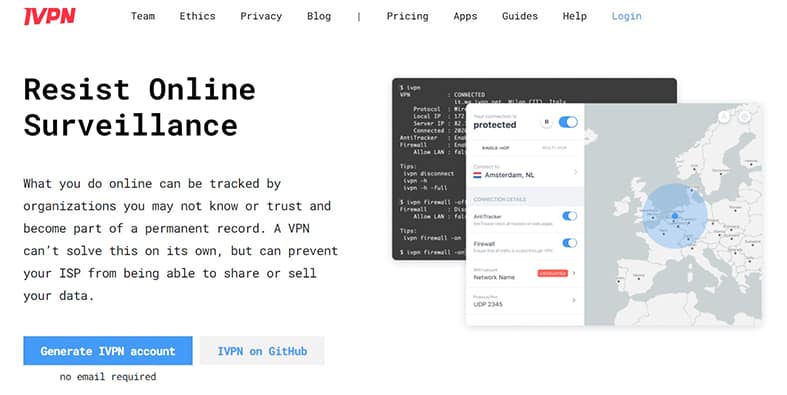
IVPN’s unique features include cryptocurrency support, a no-logs policy to protect customer data, open-source apps, multiple independent security audits, no reliance on cloud services and a straightforward description of the product being offered.
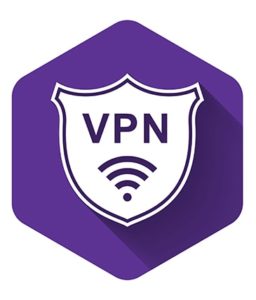
Features that make IVPN a strong contender for the best fastest VPN include dedicated apps for all major platforms, seven simultaneous connections per account and a clear 30-day money-back guarantee.
The security of IVPN is solid with tools such as strong protocol support (OpenVPN and WireGuard), multi-hop connections, WireGuard customization options, port forwarding, a firewall, an anti-tracking tool and a kill switch.
IVPN offers a “Standard” package costing $2 per week, $6 per month, $60 per year, $100 per two years or $140 per three years. The service also offers a “Pro” package (with more simultaneous connections and security tools) that costs $4 per week, $10 per month, $100 per year, $160 per two years and $220 per three years. Privatus Limited is currently the owner of IVPN.
IVPN works similarly to other good VPNs as the service redirects the user’s traffic through a remote server owned by IVPN. Using encryption, IVPN ensures that no one can read the content of the user’s data packets. The complete IVPN review describes this VPN’s functions in greater detail.
To use IVPN, users first have to go to the service’s website, generate an IVPN account ID, subscribe to a package, download the appropriate app version, install the VPN and then launch the app to finally input the IVPN account ID and connect to a server.
IVPN is one of the best fastest VPNs because of the service’s transparency (no exaggeration of what the VPN can and can’t do, along with independent audit reports), excellent privacy (a zero-logs policy), good security (encryption, multi-hop connections and a kill switch) and good discounts (the average cost of the longest plans ranges from $3.88 to $6.11 per month for three years).
6. TorGuard VPN
TorGuard VPN is one of the premium VPNs for fast and secure connections. The main advantages of TorGuard include quick connection times, lots of configuration options and live chat support. TorGuard’s cons include an underdeveloped user interface compared to competitors, poor performance on streaming services and no independent audit reports.
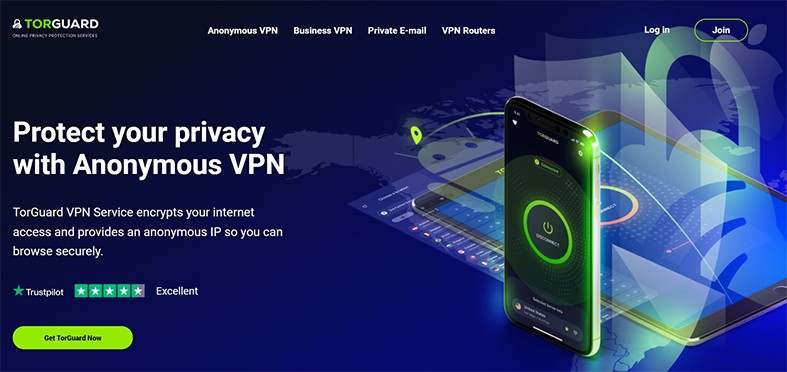
TorGuard VPN’s unique features include a range of subscription options, a dedicated streaming IP add-on, a dedicated residential IP add-on, an anonymous email service (for an extra fee) and a seven-day free trial. More features of this VPN service are detailed in a separate TorGuard review.
The features that make TorGuard a strong VPN include script availability, support for torrenting and Bitcoin payments, and eight simultaneous connections per account. The security of TorGuard is top-notch, with features such as WireGuard support, IPv6 leak protection, DNS options, a proxy service, AES and Blowfish encryption, split tunneling and the standard kill switch.
TorGuard offers four subscription options: “Standard” for $9.99 per month, “Pro” for $12.99 per month, “Business VPN” for $32.99 per month and “Anonymous Email” for $3.58 per month. VPNetworks LLC is the company that owns TorGuard.
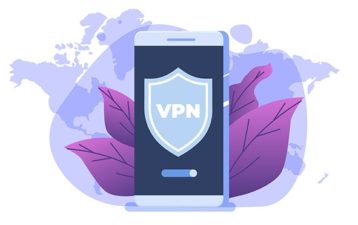
TorGuard works by encrypting user data, forming an encrypted tunnel between the user’s device and a secure VPN server, and changing the user’s IP address. This three-step process enhances user privacy and online security.
To use TorGuard, users must sign up for a package, download/install the relevant VPN app from the service’s website, launch the app and input the login credentials. Once a user has connected to a server, TorGuard starts protecting the user’s internet traffic.
TorGuard VPN is useful as a fast VPN because the service has great security features (dedicated IPs, port forwarding, a kill switch and OpenVPN support), lots of VPN servers (over 3,000) and decent discounts (close to $5 per month on some of the longer standard packages).
7. Mozilla VPN
Mozilla VPN is a new entrant in the market for the fastest VPNs. The tool is mainly used when users want reliability, fast performance and enhanced data security. Among the advantages of Mozilla VPN, the most important ones are a simple app design, advanced security features, good WireGuard implementation and an excellent privacy policy. Mozilla VPN’s weak points include the inability to work with U.S. Netflix and Amazon Prime Video consistently and a small network of only about 400 servers.
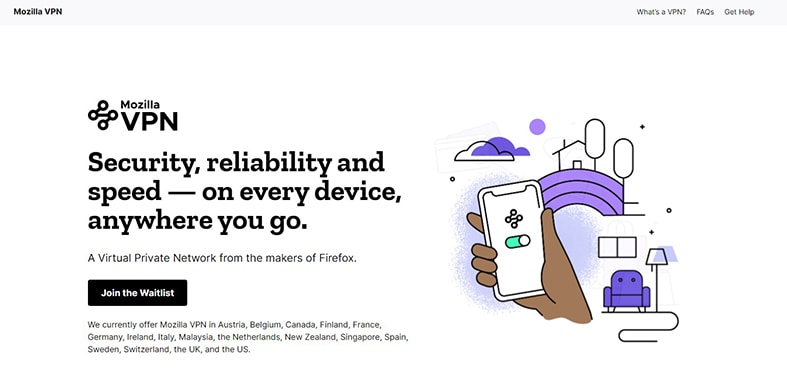
Per Security Gladiators’ full Mozilla VPN review, some of the features that distinguish this VPN from others include Mozilla’s brand behind the service, independent security audits and a server network partnership with Mullvad VPN. Mozilla VPN’s strong points are five simultaneous devices per account, a zero-logs policy, a 30-day money-back guarantee and device-level encryption.
The security of Mozilla VPN is top-notch with WireGuard support, multi-hop support, a kill switch, an ad-blocker and anti-tracker, secure DNS and split tunneling. Mozilla VPN’s pricing structure is $9.99 per month on the monthly plan, $7.99 per month on the six-month package and $4.99 per month on the 12-month package. Mozilla VPN is owned by the Mozilla Corporation, the name behind the Firefox web browser.
Mozilla VPN is similar to other good VPNs in the sense that the service uses encryption and a connection to a remote server to hide the user’s real location and protect data.

To use Mozilla VPN, users need to first download the appropriate VPN app from Mozilla’s website. Mobile users will have to go through the Apple App Store or Google Play Store, depending on the device. Then, users have to sign in with a Firefox account or via the app store. Once the app is launched, click the sliding button on the main page to get protection.
Mozilla VPN makes the list of the best fastest VPNs because of an excellent privacy policy and track record (zero logs and over 20 years of experience building privacy-first internet products), a decent security toolset (multi-hop connections, a kill switch and WireGuard encryption) and acceptable discounts (up to 50%).
8. Hotspot Shield VPN
Online users make use of Hotspot Shield VPN when there is a need to stay private and unblock content worldwide. Hotspot Shield VPN comes with many advantages, including P2P support, a responsive live chat, a free plan and the ability to unblock the vast majority of the streaming services in demand. The disadvantages of Hotspot Shield are the slightly slow iOS app, an underdeveloped support website and logging policies that could be improved for better privacy.
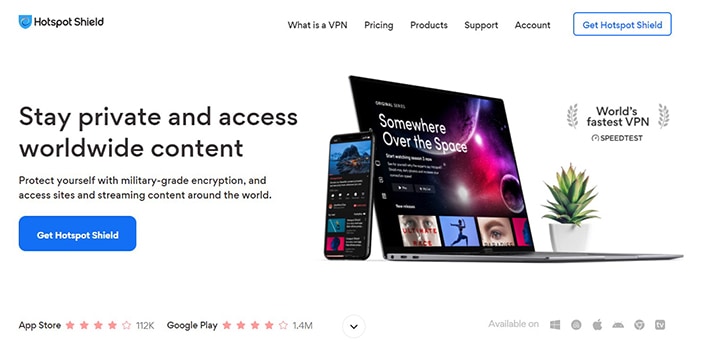
As Security Gladiators covered in the full Hotspot Shield review, this VPN comes with unique features such as a seven-day free trial on all major platforms, a password manager, a call blocker and a free proxy service. The features that make Hotspot Shield a strong contender for the best fastest VPN include a global VPN server network spanning 80 countries, a fast Windows VPN client and five simultaneous devices per account.
Aside from the free plan, Hotspot Shield VPN offers a “Premium” package for $7.99 per month if paying yearly or $12.99 per month if paying monthly. There is also the “Premium Family” package, which costs $11.99 per month if paying yearly or $19.99 per month if paying monthly. Hotspot Shield was developed by AnchorFree and is currently owned by Pango Inc. dba Aura.

Hotspot Shield works by leveraging the service’s VPN app to create an encrypted connection between the user’s device and one of the service-owned VPN servers. This protects the user from eavesdropping and other cyber threats.
To use Hotspot Shield, users only need to turn on the “Connection” button on the service’s app. The VPN app can be downloaded/installed from the company’s website once users sign up for a subscription package.
Hotspot Shield VPN is one of the better fast VPNs in the market today because the service offers excellent security options (AES cipher, Catapult Hydra, a kill switch and SmartVPN), lots of servers (just over 1,800 spanning 115 locations) and a long money-back guarantee (45 days).
9. HMA VPN
Privacy-conscious netizens make use of HMA when there is a need for real online privacy at any location on Earth. The most important advantages of HMA are zero logs, fast customer support and servers in 290 locations. HMA has some weaknesses, though, such as no support for WireGuard, inability to get around geoblocks on sites like Disney+ and U.S. Netflix, and the fact that HMA’s headquarters is based in the U.K. and thus subjected to the country’s robust surveillance programs.
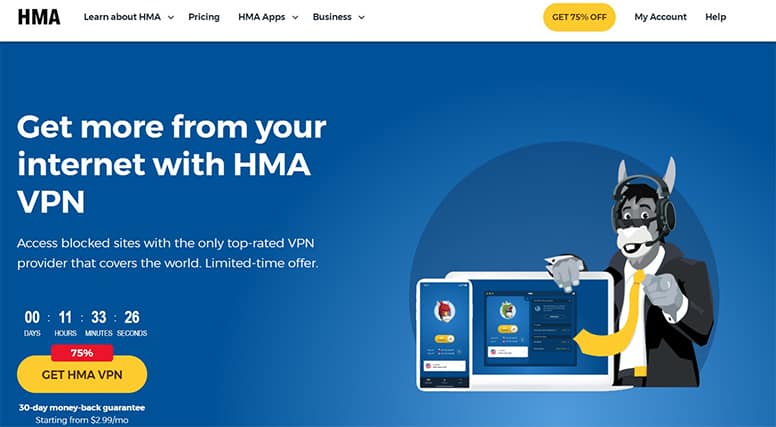
The features that make HMA somewhat unique include the use of virtual server locations, 20 Gbps server bandwidth capacity, an “IP Shuffle” feature and a free web proxy. Additionally, HMA offers the standard popular features, such as P2P support, a 30-day money-back guarantee, dedicated apps for all platforms and lots of experience.
The security of HMA is high-quality, with options such as AES 256-bit encryption, an auto-connect option, an automatic kill switch, split-tunneling, OpenVPN support and independent audits.
Setting aside the free trial option, HMA costs $4.99 per month for the 12-month plan and $2.99 per month for the 36-month plan. Currently, HMA is owned by AVG Technologies.

HMA does what every good VPN does: swap out the user’s real IP address with the IP of the VPN server the user connects to. HMA also encrypts the user’s internet connection for more data security and anonymity.
To use HMA, users first need to subscribe to a package and download the app for the device that needs protection via the service’s website. Then, launch the app, sign in and connect to a server to experience the web without any restrictions.
HMA is one of the best fast VPNs because of the comprehensive security tools (AES 256 GCM, OpenVPN protocol, RSA 4096, a “WiFi Threat Shield” feature and a kill switch), great privacy (zero logs and independent audit reports by Versprite), deep discounts and over 1,000 servers in 290 locations. More benefits are explained in the full HMA VPN review.
10. Bitdefender Premium VPN
Bitdefender Premium VPN is a new entrant in the market. The main usage of Bitdefender Premium VPN is when users want ultra-fast servers and security tools that can keep online activities safe from snoopers and hackers. The advantages of Bitdefender Premium VPN include intuitive VPN apps, the ability to unblock most streaming sites (including BBC iPlayer), affordable packages and live chat support. Bitdefender Premium’s disadvantages include a less-than-straightforward pricing structure because the VPN is paired with Bitdefender’s other products, a somewhat unclear privacy policy and high latency.
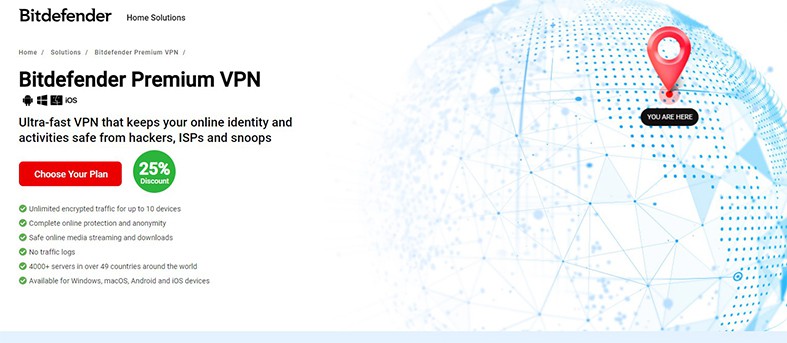
Some features that make Bitdefender Premium a unique VPN service include an award-winning security firm as the developer, a seven-day free trial and a free version. The strong points of Bitdefender Premium include 10 simultaneous connections per account, a relatively large server network, and dedicated apps for iOS, Android, macOS and Android devices.
The security of Bitdefender is comparable to the best fast VPNs because of features such as AES 256 bit, split tunneling, Catapult Hydra, TLS 1.2, a kill switch and an auto-connect option.
Bitdefender’s VPN solution comes in three subscription plans with annual rates rather than monthly: “Bitdefender Premium Security” for $69.98 (supporting 10 devices), “Total Security” for $39.98 (five devices) and “Internet Security” for $34.99 (three devices). Bitdefender LLC is the company that owns Bitdefender Premium VPN.
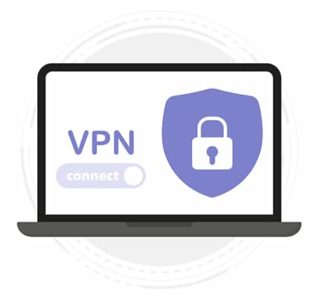
Similar to other elite VPN services, Bitdefender works by encrypting the user’s internet connection and passing all data through an encrypted tunnel that connects to a VPN server. In this way, the user’s IP address remains hidden and data protected.
To use Bitdefender Premium VPN, users first need to purchase a subscription package on the company’s website and download/install the app. Then, launch the app, agree to the terms, input the login credentials via the Bitdefender Central Account menu, input the activation code and connect to a server.
Bitdefender Premium VPN is a useful choice for the best fastest VPN because of the security features available (AES cipher, split tunneling and the backing of a reputable antivirus company), decent privacy policy (zero logs), above-average discounts and a decent number of servers (over 1,000).
Note:
Prices may differ from the ones shown as new plans and deals are launched on a regular basis. Please be sure to check the most current price on the official website.What Affects the Speed of a VPN?
The most important factors that affect VPN speed are the location and load of the server the user is connected to. With that said, there are many other factors as well, some of which are given below.

- The total number of servers on offer
- Latency rates
- The bandwidth capacity of the server connected to
- The condition of the user’s internet connection on a given day/time
- The distance between the user’s real location and the location of the server
- Specific VPN protocol used for the VPN connection
- Strength of the encryption used by the VPN app
- The hardware and software of the user’s device
- How the internet service provider routes the user’s data
How do VPN Services Provide Fast Speed?
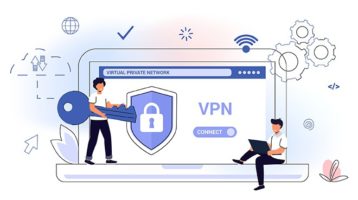
VPNs provide fast speed to users by making sure there are not too many users connected to the same server. VPN services employ different methods to keep the speed of servers fast enough. Some upgrade network servers to 10 Gbps, and a few have even upgraded servers to handle 20 Gbps bandwidth. Others use RAM-only servers to further enhance privacy and speed.
Some VPN services improve network quality by having server locations spread worldwide. This way, a user always has the option to connect to a server that is physically closer to the user’s real location, thus allowing the VPN service to improve server speed.
Other methods VPN services use to provide fast speeds are limits on bandwidth and data consumption, different protocols, the option to disable/enable encryption, a proxy service, location restriction and blocks on certain types of content (mostly video). Sometimes, even options such as split tunneling can make a given VPN faster.
Why are Some VPNs so Slow?

Some VPNs are slow because of a lack of resources. As mentioned before, too many users connecting to the same server means a slow internet experience for everyone. Some VPNs cannot afford to have thousands of servers online to avoid traffic clogs.
VPNs that are unable to implement encryption protocols properly are also slow. Not being able to offer users servers close to the user’s original location is another major reason why some VPNs are slow.
Note:
If a VPN does not have multiple servers in a high-demand area (for example, the U.S. during the Super Bowl event), that can slow down the VPN app as well.Which Countries Have the Fastest VPN Servers?
Generally speaking, all of the leading VPNs try to make servers in countries such as the U.S. and the U.K. the fastest. That’s because these countries are known as high-demand locations because of the high quality of content available via different streaming sites.
Other countries where a VPN can be the fastest—depending on the location of the user and the country in which the VPN service has been registered—are listed below.

- Germany
- Switzerland
- The Netherlands
- Japan
- Georgia
As mentioned, generally, countries with the most popular streaming services are the fastest. That’s because VPNs cover such regions with lots of servers and locations. Hence, the best countries for VPNs in terms of speed are the U.S., the U.K., Canada and Australia.
How to Boost Your VPN Speed
The tips to boost VPN speed performance are given below.
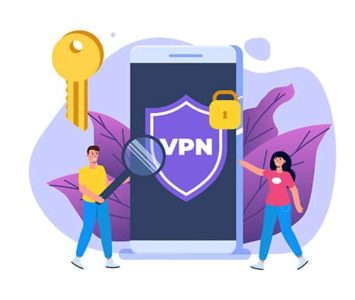
- Change Server Locations: Sometimes, a given server may just have too many users or simply too many users engaging in resource-hungry activities like torrenting or streaming. Changing the server (not necessarily the actual country) can boost VPN speeds.
- Change VPN Protocol: Currently, WireGuard is considered the fastest protocol. Many VPN apps default to either OpenVPN or IKEv2, which are slower than WireGuard.
- Get an Ethernet Connection: WiFi connections are convenient, but wired Ethernet connections offer better speed and a more stable connection.
- Close Background Applications: Sometimes, a VPN may become slow if too many apps are consuming bandwidth simultaneously on the user’s device. Similarly, security applications can degrade the performance of a VPN. Disabling or uninstalling problematic apps can boost the VPN’s speed.
- Restart the Device: Millions of lines of code must be executed every day for users to complete simple tasks on a daily basis. Sometimes, tasks do not execute in the perfect order, and VPN apps end up performing slower. Restarting the device—or even better, the router—can boost VPN speeds as well.
- Switch to UDP Connections: This mostly applies to VPN services that only offer the OpenVPN protocol. Switching from TCP to UDP connections can increase speed, though UDP connections are prone to dropping randomly.
- Enable Double VPN: This option assumes the VPN app installed on the user’s device supports double VPN connections. Double VPN can sometimes reduce latency and boost VPN speed as the user’s connection can connect to multiple servers at once, rather than a single server that may be thousands of miles away.

